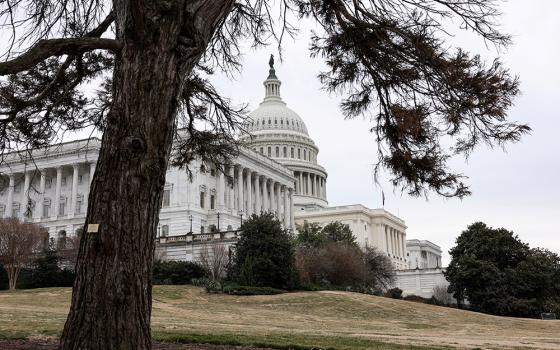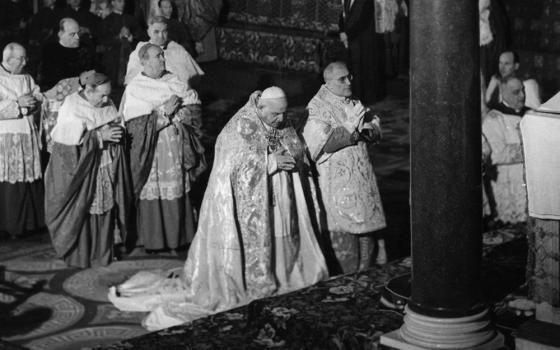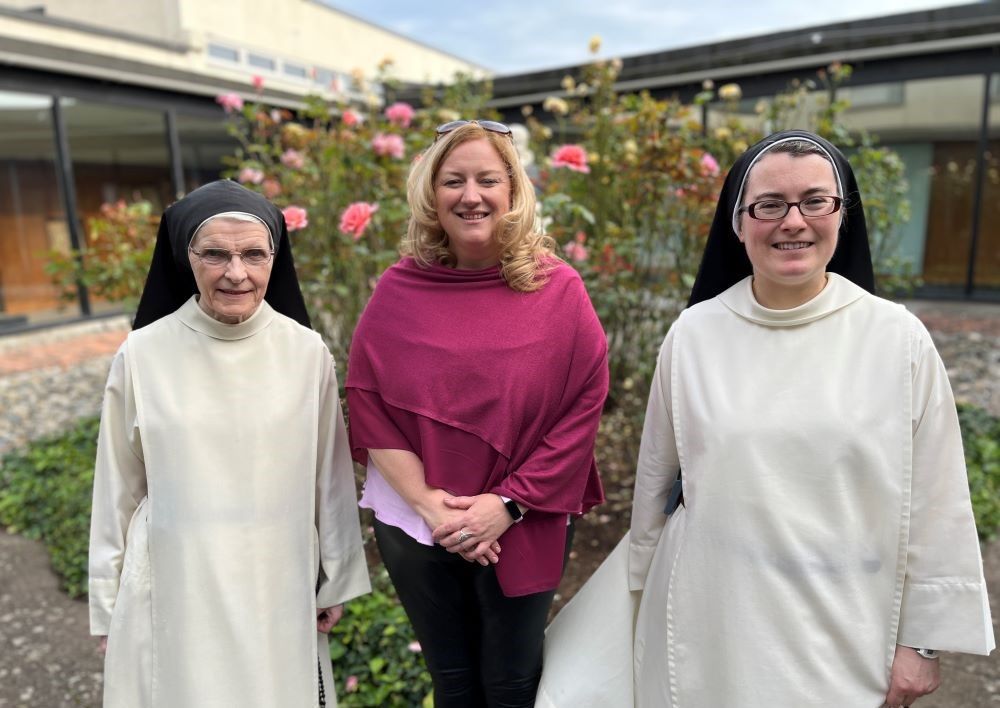
Dearbhail McDonald, center, poses with Sr. Breda Carroll and Sr. Teresa Dunphy of St. Catherine of Siena Monastery in Drogheda, Ireland. McDonald worked on "The Last Nuns in Ireland," a documentary that aired on Irish state broadcaster RTÉ in January. (© Scratch Films)
Ireland's nuns are vanishing.
Once boasting a peak number of 13,400 members — in the 1960s — Irish female religious orders today count fewer than 4,000 women, with an average age exceeding 80.
Documenting their history and cultural impact is both a matter of dwindling opportunity and still-raw sensitivities, as Ireland grapples with the spiritual damage from decades of abuse scandals. They include the hideous tragedies of the sister-run Magdalene Laundries and mother and baby homes, now the subject of confidential negotiations between the government and religious orders brokering an $875 million survivor compensation package.
It was in this charged communal context that award-winning Irish author, journalist and broadcaster Dearbhail McDonald — who honed her craft reporting on seemingly scandal after scandal in the church — undertook the television project that became "The Last Nuns in Ireland."
The documentary — and a companion piece, "The Last Priests in Ireland" — aired on Irish state broadcaster RTÉ in January.
Trained as both a lawyer (Trinity College Dublin) and journalist (Dublin City University), McDonald — still a self-described "St. Clare's girl," referencing her convent school education — admits she struggled "to reconcile the undoubted achievements of our women in religious orders with the undeniable legacy of abuse."
"The Last Nuns in Ireland" is, then, both a personal and public attempt to make some kind of peace with a complicated spiritual and cultural legacy.
Global Sisters Report: Could you tell us about the inspiration for this project? As Ireland rapidly secularizes and religious orders dwindle in numbers, did you feel an urgency to document the lives of these women now?
McDonald: The starting point of this project was a pitch by Scratch Films to RTÉ to undertake an archiving project to record elderly priests' and nuns' life stories before they are lost.
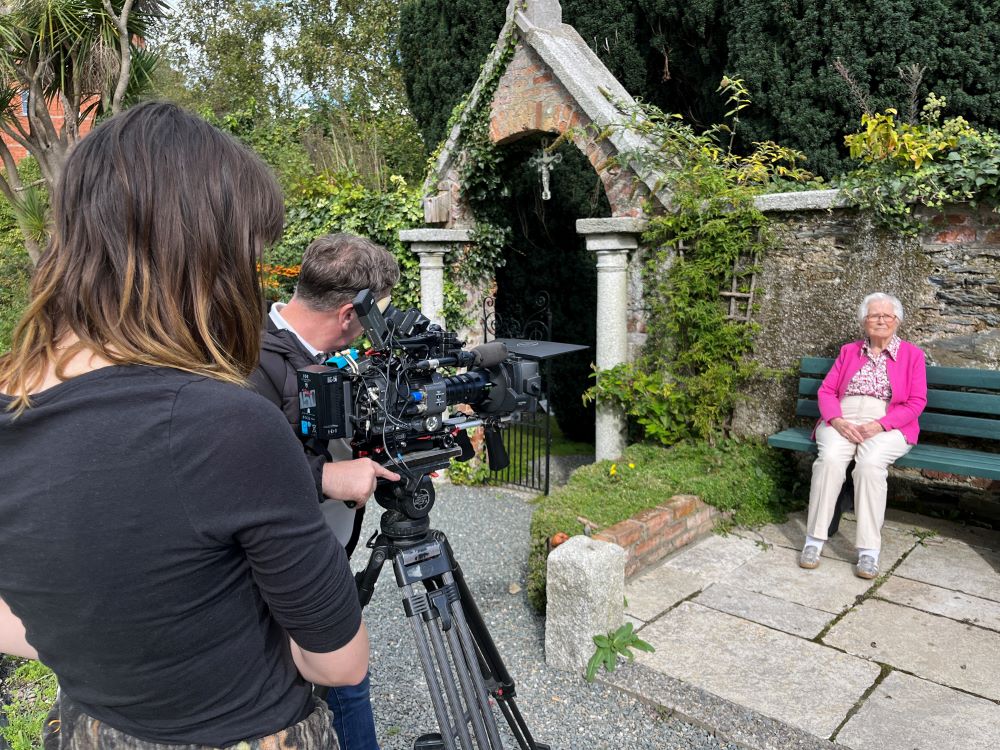
Sr. Marian O’Sullivan is seen with the film crew of "The Last Nuns of Ireland." O'Sullivan is a Dominican Sister of Cabra who was formerly her congregation's superior and founder of an ecology center and organic farm in Wicklow, Ireland. (© Scratch Films)
The past couple of decades have been very difficult for the Catholic Church in Ireland. You've asked if we can both acknowledge the harm done — such as the Magdalene Laundries — while also balancing it with the good, such as building national health and education systems. Is that possible, and if so, how?
"Last Nuns in Ireland" and its counterpart, "Last Priests in Ireland," were in many ways a new starting point for a difficult national conversation which acknowledges both the incredible contribution of Ireland's religious over centuries and its more recent abuse scandals, particularly in clerical and institutional settings. There are many difficult chapters ahead, including the excavation of the remains at a former mother and baby home in Tuam, Galway, school patronage and the vexed question of the transfer and sale of church assets.
Reconciliation, for me, is only truly possible once the church itself comes to terms with the abuse controversies and there is a full opening of archives, not just for victims and academic scholars, but so that we, the public, can better understand our history.
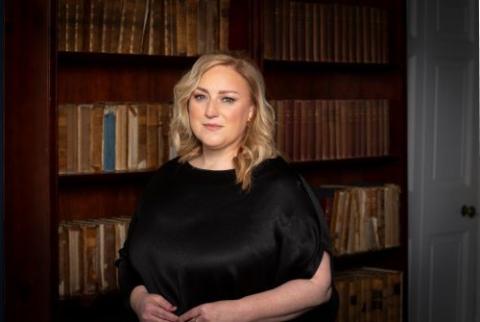
Author and journalist Dearbhail McDonald struggles to reconcile the achievements of women religious with the legacy of abuse. (© Scratch Films)
You're convent-educated yourself. What would you say that you took from that experience — both positive and negative — that shaped your own life and career?
The Sisters of St Clare and their charism were vital to my life's formation, spiritually, socially, personally and professionally.
I cannot deny that.
They gave me the gifts to take my place in the world as a journalist, author and broadcaster, one who used those gifts to help expose many of the crises that engulfed the institutional church. That can't have been easy for them at times.
They were my teachers, many of them are still my friends and they are proud of the many generations of women that they educated.
In interviewing these nuns and visiting their communities, what did you perhaps find most surprising about their lives and legacy?
What was surprising about these women was the depth of their faith, despite all of the scandals. I was impressed by their wit and wisdom, their resilience and the sense that their life's vocation is not defined by declining numbers.
The average religious order lasts around 200 years, so many of our once dominant education and health orders are approaching fulfillment of their missions in any event, contemplating closure in some cases, or redirecting their focus to other parts of the world where there is growth.
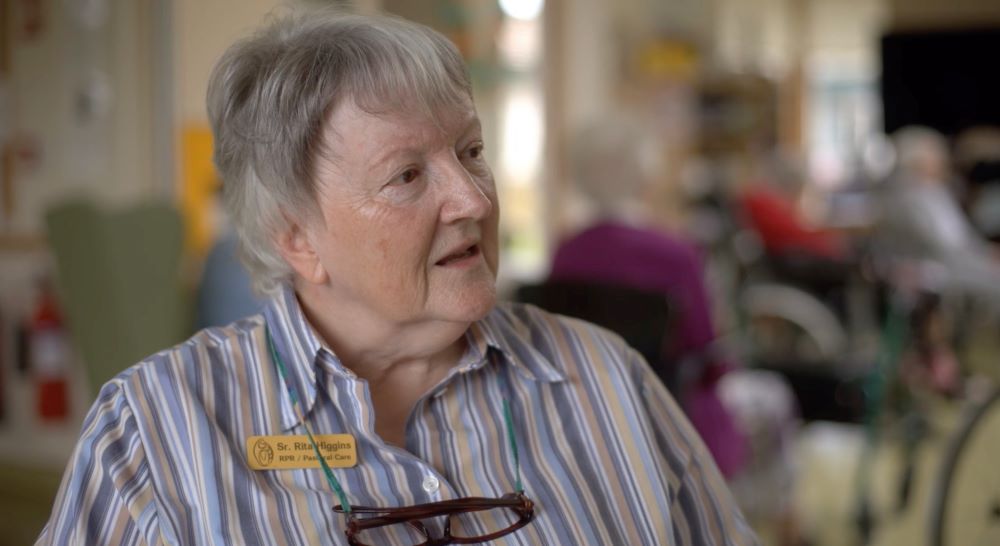
Sr. Rita Higgins is a member of the Medical Missionaries of Mary, an order founded in 1937 that provides medical services worldwide. (© Scratch Films)
What do you hope viewers will take away from the program?
I think viewers will begin to acknowledge that the legacy of "the nuns" is not, like their former wimples and habits of old, simply black and white.
That they were pivotal to the birth of the Irish State, to the creation of its institutions and, critically, the education of its women and girls. That the sisters are an intrinsic part of our social and economic history as much as our spiritual one. Perhaps they will realize that many nuns and sisters were themselves victims of an overly clerical and hierarchical church and that many have deep regrets about the abuses that took place in many of the institutions that they ran.
Advertisement
How do you imagine the Catholic Church in Ireland may look in 10 years? There has been some emphasis on a more robust role for non-professed laity. Is that the future as religious orders decline?
I think the Catholic Church in 10 years' time will be leaner, with an increased role, by necessity, for the laity.
I'm not confident that women will be granted more equality or decision-making, be that for women religious or laity.
I also fear that the church in the future will become more conservative and inward-looking, but let's see how that plays out.
I predict that female-enclosed orders will continue to thrive in their own, quiet manner. The days of mega schools and hospitals will fall away, but women religious will still devote time and resources to those in need.
"The Last Nuns In Ireland"? I may have spoken too soon on that one!





